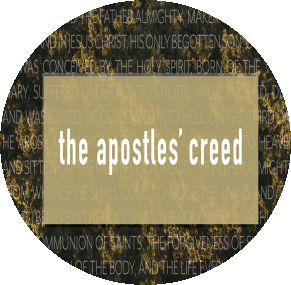
The word believe does not mean to think, to suppose, to be of opinion: but as the Sacred Scriptures teach, it expresses the deepest conviction, by which the mind gives a firm and unhesitating assent to God revealing His mysterious truths. As far, therefore as regards the use of the word here, he who firmly without hesitation is convinced of anything is said to believe.- Catechism of the Council of Trent
True faith is not an emotional, wishful thinking; it is an inner conviction based on the Word of Christ
Faith then cometh by hearing; and hearing by the word of Christ. Romans 10:17
It is obvious that unless something is said, it can neither be heard nor believed-Ambrosiaster
It is perfectly clear to us , says Paul, following the voice of the prophet and what we have said, that there can be no faith without teaching-Theodore of Mopsuestia
Faith comes by hearing , because when we hear the Holy Scriptures we believe in the teaching of the Holy Spirit. This faith is made perfect by all the things which Christ has ordained; it believes truly, it is devout and it keeps the commandments of him who has renewed us. For he who does not believe in accordance with the traditions of the Catholic Church...is without faith.-John of Damascus
Hebrews 11 also known as the Hall of Faith
Now faith is the substance of things to be hoped for, the evidence of things that appear not. Hebrews 11:1
Looking on Jesus, the author and finisher of faith. Hebrews 12:2
I. FAITH DESCRIBED
Hebrews 11:1 gives us a twofold definition of faith. Let's look at both parts, one at a time: "Now faith is (1) the substance of things to be hoped for, (2) the evidence of things that appear not. "
There is more here than meets the eye at first. The word for "substance" in the first definition ("the substance of things hoped for") and the word for "evidence" in the second definition ("the evidence of things not seen"), are unusual words and very difficult to translate into English. These words "substance" and "evidence" are, in fact, very serious and important translations. The Latin words for these two words are, substance-substantia, and evidence-argumentum. What is the reality behind these two words and these two definitions of faith?
Ask yourself this question: do you have faith? How do you know you have faith? What is faith, so that you can know you have it? What hangs on whether you have faith or not?
Let's start with the second definition first: "Faith is the evidence of things that appear not." The word for "evidence" is not used anywhere else in the New Testament. Outside the New Testament, its normal use is "proof" or "argument"- something objective - about the world rather than subjective about how we feel about the world.
But what about the meaning here in verse 1? How can faith be evidence or proof? Faith needs evidence, doesn't it? But let's look at the illustration of this definition of faith in verse 3. Verse 3 is directly related to this definition of faith as "the evidence of things not seen." It says, "By faith we understand that the world was framed by the word of God; that from invisible things visible things might be made. "
Do you see the connection? Verse 1 says "the evidence of things that appear not." and verse 3 says that faith understands that the world - what is seen - was made out of what is not seen - the word of God. So verse 3 is a specific illustration of the definition of faith in verse 1b.
How do we know that God made the world out of nothing that is seen? Not only were we not there when it happened, but, even if we had been there, we would not have been able to see the act of creation, because you can't see the word of God. So how can we know or "understand" that the worlds were made by the word of God? How can we know that "what is seen was made out of things invisible" - in particularly the word of God?
Verse 3 answers, "by faith." "By faith we understand that the world was framed by the word of God". If "faith is the evidence of things that appear not," then it might make sense to say, "By faith (by evidence) we understand that the worlds were prepared by the word of God."
How is Faith "Evidence"?
So the crucial question is: How is faith "evidence" of things unseen, namely, that God created the world by his word? Lets look at one other place in the New Testament where God's invisible attributes are said to be "clearly seen" by man, namely, Romans 1:20. "For the invisible things of him [God's attributes], from the creation of the world, are clearly seen, being understood by the things that are made." The word "understood" here in Romans 1:20 is the same word as in Hebrews 11:3, "By faith we understand that the world was framed by the word of God"
So there in Romans 1:20 it says, "we understand the invisible things of him, that is the attributes of God by the things that are made." And here in Hebrews 11:3 it says, we understand the invisible word of God behind creation by faith. Romans 1:20 seems to say that the evidence that God made the world is the things made - they clearly point to a Maker. Hebrews 11:3 seems to say that the evidence that God made the world is faith. Now think about this for a moment. Faith, at least in part, is the spiritual seeing or perceiving of the fingerprints of God on the things he has made. Now the fingerprints of God on the things he has made are the evidence that God made the world. But so is the seeing of these fingerprints a kind of evidence. It's just the other side of the coin. If you ask me, "How do you know that Rome is the headquarters of the Church of Rome" I will say, "I saw it on Tuesday." My seeing is evidence that it is there.
That is the way faith is the evidence of things unseen. We all look at the same fingerprints, but some see and some don't. Those who see have the evidence, the testimony, in themselves. How can that be?
Color and Chaos or a Deeper View?
A few years ago one of the rages was hidden 3-D images. These are pieces of art that, on one level, are one thing, but at another level are something quite different. At first glance all you see is the surface presentation. But if you let your eyes focus more deeply, or more distantly, you may see a train or a boxing kangaroo or a globe not only appearing, but actually standing up off the page. Now some people stare at these pages for several minutes and see nothing but color and chaos. But others almost immediately see the head of Beethoven or a lamb. If someone says, "How do you know a lamb is there?" the answer is, "I see it." You're seeing is the evidence. They may not see it, but that won't change your mind.
Now this is what it is like for some to look at God's creation. Some see color and chaos. Others have a deeper view and suddenly God's fingerprints come into focus. What evidence can they offer? They see it. It is as undoubted as a train in a 3-D image. No one can talk you out of it.
Hebrews 11:1 says, "Faith is the evidence of things that appear not." And then the writer of Hebrews illustrates this in verse 3 when he says that "we understand by faith" that God created the world. It is a spiritual act that sees the fingerprints of God. This does not mean that you believe them into being. That would be wishful thinking. Its is not the power of positive thinking. That is not authentic faith. Real faith is based on real Truth. It looks deeply at the world God has made - looks through it, so to speak - and by the grace of God, it sees the glory of God. Psalm 19:1 says standing out off the creation like a 3-D image.
The heavens shew forth the glory of God, and the firmament declares the work of his hands. (Douay Rheims Psalms 18:2)
The Substance of Things Hoped For
Now that leaves us focusing on the other part of the definition of faith in verse 1: "Now faith is the substance of things to be hoped for"
The word "substance" here can mean "nature" "reality" or "essence" in other places, for example, Hebrews 1:3 "the figure of his substance" is referring to the express image of God's nature. If that is what is meant here, then we should think like this.
What could the "substance" or "nature" of things hoped for mean? It means that faith sees' the goodness and the sweetness of what God promises so clearly that this goodness and sweetness are substantially present in faith. In other words, faith grasps or lays hold of God's promises so firmly that in the faith itself there is the substance of the hope promised. Faith doesn't create what we hope for. Faith is a spiritual apprehending or perceiving or tasting or sensing what God promises - especially his own fellowship in prayer, and the enjoyment of his own presence in the Eucharist.
Faith does not just feel confident that this is coming some day. Faith has spiritually laid hold of and perceived and tasted that it is real. And this means that faith has the substance or the nature of what is hoped for in it. Faith's enjoyment of the promise is a kind of substantial down payment of the reality coming.
Taste and See
This is what happens when the Gospel is proclaimed. The word of God is spoken. It is broken like bread and poured out like water on to your soul, and the spiritual taste of your heart is awakened, and you know that there is more here than the mere opinion of a man. Just like it says in Hebrews 10:34, you "knowing that you have [in heaven] a better and a lasting substance."
In summary then faith is a kind of spiritual tasting of what God has promised so that we feel a deep, substantial assurance of things hoped for; and faith is a kind of spiritual seeing of the invisible fingerprints of God in the things he has made.
So I say with the Psalmist "O taste, and see that the Lord is sweet: blessed is the man that hopeth in him." Psalm 34:8/DB Psalms33:9
II. FAITH DEMONSTRATED
A. Abel- A faith that worships God.
By faith Abel offered to God a sacrifice exceeding that of Cain, by which he obtained a testimony that he was just, God giving testimony to his gifts; and by it he being dead yet speaketh. Hebrews 11:4; see Genesis 4:3-5a.
God asked for a sacrifice. While we don’t have a complete picture from Scripture, we do have enough information to help us make some logical assumptions. While Cain and Abel's offering in Genesis 4 appears with no explicit explanation as to why the offering is being made, we do have other Scriptures to help us understand.
First, we know this wasn't the first offering recorded in Scripture, The very first offering was made in Genesis 3:21, when God made clothes of animal skin for Adam and Eve to cover their nakedness. Using animal skins means animals were killed,blood was shed, most likely as a sacrifice for the sin in the Garden.
And almost all things, according to the law, are cleansed with blood: and without shedding of blood there is no remission. Hebrews 9:22
The fact that God made an offering for Adam and Eve's sin and that Abel and Cain are making offerings that include at least one animal's death allows us to assume that God had instructed Adam and Eve to make such offerings going forward, and they naturally passed that instruction on to their children.
In fact, it only makes sense to assume God instructed man concerning sacrifices, otherwise how God could be said to be pleased or displeased with Abel and Cain's offerings? While the heart of the one offering is ultimately most important, we know from later Scripture that the manner of our offerings are also important to God.
This was the moment in which God decided to confront Cain’s unbelief. Both Abel and Cain offered more than one thing, so God was not displeased with the manner of Cain's offering but with his heart, that is his lack of faith.
B. Enoch -A faith that walks with God.
By faith Enoch was translated, that he should not see death; and he was not found, because God had translated him: for before his translation he had testimony that he pleased God.But without faith it is impossible to please God. For he that cometh to God, must believe that he is, and is a rewarder to them that seek him. Hebrews 11:5-6; see Genesis 5:21-24.
In a wicked age, Enoch lived a dedicated life; he did this by trusting God’s Word.
Now of these Enoch also, the seventh from Adam, prophesied, saying: Behold, the Lord cometh with thousands of his saints Jude Verse 14.
He believed that God would reward him for his faith, and God did so by taking him to heaven so that he did not die.
C. Noah- a faith that works for God.
By faith Noah, having received an answer concerning those things which as yet were not seen, moved with fear, framed the ark for the saving of his house, by the which he condemned the world; and was instituted heir of the justice which is by faith. Hebrews 11:7; see Genesis 6-9.
No one had seen or anticipated judgment through a flood; Noah saw it by faith. Faith leads to works. Noah’s attitude and actions condemned the unbelieving, wicked world around him.
D. The patriarchs- a faith that waits on God.
1. Abraham- Hebrews 11:8-19; Genesis 12-25.
Here we have the great “father of the believing” who is one of the OT’s, greatest examples of faith. Abraham believed God when he did not know where (11:8-10), when he did not know how (11:11-12), when he did not know when (11:13-16), and when he did not know why (11:17-19). It was faith in God’s Words that made him leave his home, live as a pilgrim, and follow wherever God led. Faith gave Abraham and Sarah power to have a child when they were “as good as dead.” Abraham and his pilgrim descendants did not turn back, as the Hebrew leaders were tempted to do, but kept their eyes on God and pressed on to victory (11:13-16; 10:38-39).
2. Isaac
By faith Isaac blessed Jacob and Esau concerning things to come. Hebrews 11:20; see Genesis 27.
He believed the Word passed on to him from Abraham and conferred the blessing on Jacob.
3. Jacob
By faith Jacob dying, blessed each of the sons of Joseph, and adored and worshippe, leaning upon the top of his rod. Hebrew 11:21; see Genesis 48
In spite of his failures, Jacob had faith in God’s Word and blessed Ephraim and Manasseh before he died.
4. Joseph
By faith Joseph, when he was dying, made mention of the going out of the children of Israel; and gave commandment concerning his bones. Hebrew 11:22; see Genesis 50:2; Exodus 13:19; Joshua 24:32
Joseph knew that Israel would one day be delivered from Egypt, for this is what God promised Abraham (Genesis 15:13-16). It is amazing that Joseph had any faith at all, after going through so many trials and after living in pagan Egypt most of his life.
E. Moses- a faith that is watching for God
See Hebrews 11:23-29; Exodus 1-15
Moses’ parents had faith to hide Moses since God had told them (in some way) that he was a
special child.
At the same time was Moses born, and he was acceptable to God: who was nourished three months in his father's house. Acts 7:20
Moses’ own faith led him to refuse position in Egypt and to identify with Israel. Again, he saw the reward of faith as opposed to the pleasures of sin for a season.
Rather choosing to be afflicted with the people of God, than to have the pleasure of sin for a time, Esteeming the reproach of Christ greater riches than the treasure of the Egyptians. For he looked unto the reward. Hebrews 11: 25,26
Faith in the Word led to the Passover deliverance (how the Egyptians must have scoffed at the blood on the doors!) and the crossing of the Red Sea.
F. Joshua- a faith that is warring for God.
By faith the walls of Jericho fell down, by the going round them seven days. Hebrews 11:30; see Joshua 1-6.
God promised to deliver Jericho to Joshua, and faith in that promise led to victory. Israel marched around the city for seven days and must have looked foolish to Jericho’s citizens, but the Jews’ faith was rewarded.
G. Rahab- a faith that is winning
By faith Rahab the harlot perished not with the unbelievers, receiving the spies with peace. Hebrews 11:31; see Joshua. 2; 6:22-27
Her confession of faith is in Joshua 2:11. Her faith led to works when she risked her life to save the spies. Though a harlot, she was saved by faith and was even brought into the human ancestry of Christ (Matthew 1:5). Her faith was contagious because she also won her family.
And the young men went in and brought out Rahab, and her parents, her brethren also and all her goods and her kindred. Joshua 6:23
H. “Others” a faith that is withstanding
(See Hebrews 11:32-40.)
Some people are named, others are not. All these men and women, nevertheless, are among the giants of the faith. The writer sees the entire OT history as a record of victories of faith.
a. Gideon; destroyed the altar of Baal, and with only a handful of men, delivered Israel from the ravages of the Midianites (Judges 6-7).
b. Barak; (Judges 5) is a surprise in the list, since he refused to take the field of battle against Sisera unless the prophetess Deborah went with him.
c. Samson; (Judges 13-16) was born in answer to prayer and the promise of an angel who appeared to his parents; he was a Nazarite from birth and was moved by the spirit of the Lord, to whom he prayed, and by whose special powers he performed feats of superhuman
strength throughout his tragic life.
d. Jephthah; usually remembered for his rash vow (Judges 11-12); but it is his faith that comes to the mind of the author. Jephthah spoke one word that should be the motto of every believer on earth, "I have opened my mouth to the Lord, and I cannot go back" (Judges. 11:35).
e. David; the man after God's own heart, is the only king of Israel in the list; and his deserving to be so stems not from his flagrant sin, but from his willingness, in humility and penitence, to confess it and seek God's forgiveness. David was inspired of God, uttered great prophecies of the coming Messiah, wrote the marvelous book of Psalms, and gathered the material for the construction of Solomon's temple. On the whole, he was an inspiring
example of faith.
f. Samuel; the noblemen of faith, born in response to prayer to the service of God from earliest childhood, and one who lived a remarkably blameless life, almost his only sin being parental indulgence of his godless sons.
g. The prophets; an inclusion of all those inspired men through whom the word of the Lord was delivered to men for the purpose of shedding light on the moral and religious problems of their own times, as well as for the enlightenment of people regarding the coming of God's
Holy One, the Messiah. Their endurance of hardship, suffering, privation, persecution, trials, and martyrdom, they had in common with all the ancient worthies; but at one point their faith encountered a unique test, in that they did not always themselves understand the meaning of the words the Lord gave them to speak, although they exerted the greatest diligence to do so.
Some victories were public and miraculous, such as deliverance from death; others were private and rather ordinary, such as out of weakness were made strong and wrought justice.
Some were delivered by faith; others did not escape, but were, by faith, given grace to bear suffering. Although the great heroes who achieved the remarkable things mentioned in this list are left anonymous in this reference to them, a familiarity with the OT reveals the identity of many of them.
Hananiah, Mishael, and Azariah (Daniel 1-2) who through faith quenched the power of fire. Their faith was so strong that although they confessed that God might not choose to deliver them, they nevertheless refused to worship the king's image, knowing they would certainly be thrown into the fiery furnace.
Of those who escaped the edge of the sword must be reckoned Elijah 3 Kings 19:2 (DRB), I Kings 19:2
Elisha 4 Kings 6:31 (DRB) 2 Kings 6:31 and Jeremiah Jeremiah 36:19,26 who escaped, in turn, the swords of Jezebel, Jehoram, and Jehoiakim. Alas, some did not escape, as Hebrews 11:37 indicates.
OT instances of women receiving back their dead in a resurrection are: The widow of Sarepta 3 Kings 17:17-24 (DRB) 1 Kings 17:17-24, whose son was raised by Elijah.
The Shunamite woman 4 Kings 4:18-37 (DRB) 2 Kings 4:18-37, whose son was raised by Elisha.
The unbelieving world looked upon these believers as refuse, “cranks,” and “pests.” God, though, says of them, “Of whom the world was not worthy” Hebrews 11:38. Each of them received from God that witness of faith. "Being approved by the testimony of faith" Hebrews 11:39
The Apostles Creed
The Apostles’ creed is the oldest statement of faith in the Catholic Church, written sometime in the second century AD. The creed defines core Christian beliefs about God, Jesus, the church, salvation, and other theological topics. (Tap Here)
The Ten Commandments
The ten laws given to Moses and Israel on Mt Sinai served several purposes.
To Israel the law revealed the nature of God.
The second purpose of the law was to reveal to each person that they could not obey God’s holy law.
The third purpose was civil. The law provided a framework for the creation of a just society. (Tap Here)
The Lord's Prayer
We approach the Lord’s Prayer with humility, saying with the first disciples, “Lord, teach us to pray.” Through prayer we journey from wherever we are on earth to the very heart of God. (Tap Here)
The Sacraments
So what is a sacrament? Many people think the sacraments are a pledge or dedication of our lives to God. However, the sacraments are actually much greater and bigger than that. They are not so much things we do for God but are actually the means God uses to grace us. The sacraments are vital practices of the Church that confesses that Jesus is God and Savior of the world. As such, it is important to understand what they are and why they are important. (Tap Here)
Precepts of the Church
In the Catholic Church, the Precepts of the Church, sometimes called Commandments of the Church, are certain laws considered binding on the faithful. As usually understood, they are moral and ecclesiastical, broad in character and limited in number. In modern times there are five. These specifically Catholic commandments are additional to the Ten Commandments. (Tap Here)
Bible Courses
Lamp and Light Bible Study is not a ‘theological’ study but a ‘life application’ study.
Our in house Priest will show that every single book of the Bible is interesting and has a message for us today. It deals with key aspects of the Christian life and speaks more to the heart than to the head. (Tap Here)













 Follow
Follow

